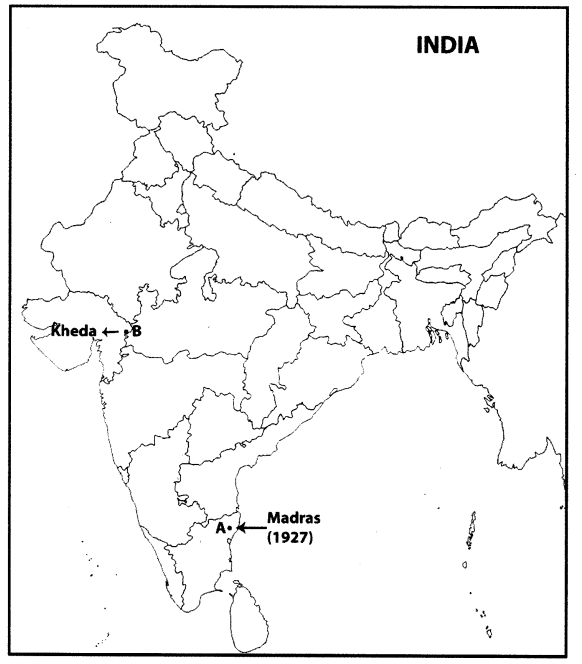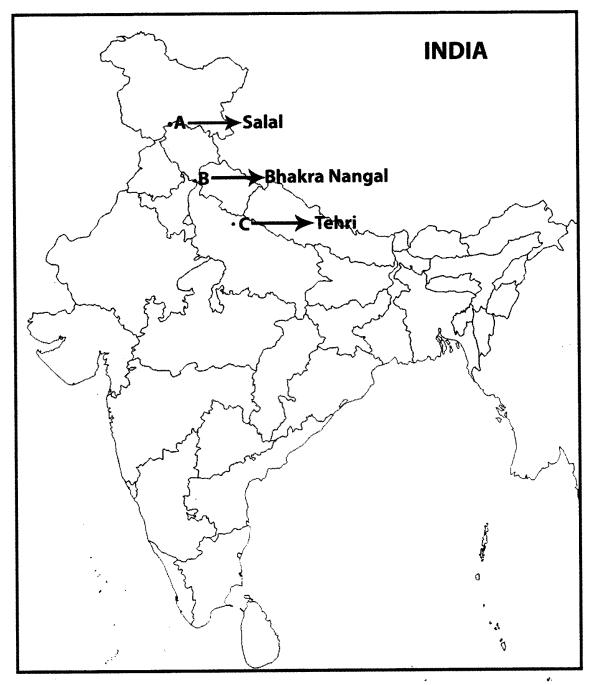These Sample papers are part of CBSE Sample Papers for Class 10 Social Science. Here we have given CBSE Sample Papers for Class 10 Social Science Paper 3.
CBSE Sample Papers for Class 10 Social Science Paper 3
| Board | CBSE |
| Class | X |
| Subject | Social Science |
| Sample Paper Set | Paper 3 |
| Category | CBSE Sample Papers |
Students who are going to appear for CBSE Class 10 Examinations are advised to practice the CBSE sample papers given here which is designed as per the latest Syllabus and marking scheme as prescribed by the CBSE is given here. Paper 3 of Solved CBSE Sample Paper for Class 10 Social Science is given below with free PDF download solutions.
Maximum Marks : 80
Time : 3 hrs
General Instructions
- The question paper has 27 questions in all. All questions are compulsory.
- Marks are indicated against each question.
- Questions from serial number 1 to 7 are very short answer type questions. Each question carries one mark.
- Questions from serial number 8 to 18 are 3 marks questions. Answer of these questions should not exceed 80 wrods each.
- Questions from serial number 19 to 25 are 5 marks questions. Answer of these questions should not exceed 100 words each.
- Question number 26 is map question from History with 2 marks.
- Question number 27 is map question of 3 marks from Geography.
- For Q. Nos. 26 and 27 (map based questions) one outline political map of India is provided. After completion the work, attach the map inside your answer book.
Question 1.
Who wrote ‘Hind Swaraj’? (1 Mark)
OR
What is Begar?
Question 2.
What was ordinance 10? (1 Mark)
OR
What did Noam Chomsky say about the war?
Question 3.
In which states are majority of sugar mills concentrated? (1 Marks)
Question 4.
What does the federal division of power imply? (1 Mark)
Question 5.
Which two Indian states have been given special status? (1 Mark)
Question 6.
What is the term Afro-African used for? (1 Mark)
Question 7.
How many recognised national parties are there in India? (1 Mark)
Question 8.
Name the factors which prevented economic growth in Vietnam. (3 Marks)
Question 9.
Explain the main features of the first printed Bible. (3 Marks)
Question 10.
How is mica one of the most indispensable minerals? Explain any three points. (3 Marks)
Question 11.
State any three problems faced by road transport in India. (3 Marks)
Question 12.
What are the functions of the Mayor? (3 Marks)
Question 13.
Examine the political outcomes of democracy. (3 Marks)
Question 14.
How is political expression of social division in democracy beneficial? (3 Marks)
Question 15.
Write a note on the National commission for women. (3 Marks)
Question 16.
What is the effect of globalisation on small producers and workers? (3 Marks)
Question 17.
How is the concept of Self-Help Groups important for poor people? (3 Marks)
Question 18.
What are the various ways in which countries can be linked? (3 Marks)
Question 19.
How was the condition of the urban family transformed by the 20th century? (5 Marks)
OR
Even before industrialisation there was enough production for sale in international market in rural India. – Why?
Question 20.
Discuss the events of the civil disobedience movement. (5 Marks)
OR
Why did the Muslims not join the Civil Disobedience Movement?
Question 21.
What is soil erosion? Suggest measures of soil conservation in hilly, mountainous and in desert areas. (5 Marks)
Question 22.
Describe the rooftop rainwater harvesting technique. (5 Marks)
OR
What are the various means of communication used in India in current times?
Question 23.
Differentiate between National and regional parties. (5 Marks)
Question 24.
The credit activities of the informal sector should be discouraged — Discuss. (5 Marks)
OR
What is the role of manufacturing sector in India?
Question 25.
What are the various ways in which people are exploited in the market? (5 Marks)
OR
State any five rights of the consumers.
Question 26.
On the outline map of India locate (2 Marks)
- I.N.C. session held in 1927
- Peasant Satyagraha.
Question 27.
On the outline map of India locate the following dams (3 Marks)
- Salal
- Bhakra Nangal
- Tehri
Answers
Answer 1.
Mahatma Gandhi.
OR
Forced labour without payment (1)
Answer 2.
French law that permitted Christianity and outlawed Buddhism.
OR
Greatest threat to peace, self determination and international co-operation (1)
Answer 3.
Uttar Pradesh and Bihar. (1/2+1/2)
Answer 4.
Means power sharing at different levels of government. (1)
Answer 5.
Jammu and Kashmir and Arunachal Pradesh. (1/2+1/2)
Answer 6.
Africans who were brought into America as slaves. (1)
Answer 7.
Six. (1)
Answer 8.
- Huge population size.
- Low agricultural productivity.
- Extensive indebtedness among the peasants. (1 + 1 + 1)
Answer 9.
- 180 copies were printed in about three years.
- The text was printed in the New Gutenberg press with metal type.
- Borders were carefully designed, painted and illuminated by hand by artists. (1 + 1 + 1)
Answer 10.
- It has excellent dielectric strength.
- Low power loss factors.
- Insulating properties and resistance to high voltage. (1 + 1 + 1)
Answer 11.
- The National Highways are inadequate.
- Most of the bridges and culverts are old and narrow.
- Road transport is inadequate and volume of traffic and passengers is high. (1 + 1 + 1)
Answer 12.
- Presides over the meetings of the corporation.
- Regulates the conduct of business at such meetings.
- Channel of communication between the commissioner and the state government. (1 + 1 + 1)
Answer 13.
- Accountable, responsible and legitimate government.
- Promotes, regular, free and fair elections.
- Generates its own political support for itself. (1 +1 +1)
Answer 14.
- Political expression of social division allows disadvantaged and marginal social groups to express their grievances.
- Such an expression often results in their cancellation and reduces intensity.
- It is the best way to fight for recognition and also to accommodate diversity. (1 +1 +1)
Answer 15.
- It deals with issues relating to women’s rights.
- It can review legislation, intervene in complaints to safeguard the interest of women.
- It can ask the state government to get the complainant justice or rectify the violation of their rights. (1 + 1 + 1)
Answer 16.
- Small producers and workers have been hit hard due to the competition.
- MNCs look for cheapest goods to maximize profits.
- To get large orders exporters try to cut labour cost. (1 +1 + 1)
Answer 17.
- They help the borrowers to overcome the problem of lack of collateral.
- They help them to become financially self reliant.
- They provide a platform to hold meetings to discuss their problems. (1 + 1 + 1)
Answer 18.
- Movement of goods between countries.
- Foreign investment done by one country in another country.
- Immigration of people into one country from another. (1 + 1 + 1)
Answer 19.
- Ties between the members loosened and institution of marriage tended to break down.
- In upper and middle class families the life of women was made easier by maids.
- Women participated in political movements and demanded the right to vote.
- By 20th century they started working in wartime industries.
- The family consisted of much smaller units. (1 + 1 + 1 + 1 + 1)
OR
- Merchants supplied money to rural artisans
- Power trade guilds in cities
- Producers maintained strict control in cities
- Difficult for new entrants in cities
- Easy entry in countryside.
- It began with Gandhi breaking the salt law at Dandi.
- There was boycott of foreign cloth and picketing of liquor shops.
- Forest people violated forest laws.
- Peasants refused to pay revenue and Chaukidari taxes.
Answer 20.
- It began with Gandhi breaking the salt law at Dandi.
- There was boycott of foreign cloth and picketing of liquor shops.
- Forest people violated forest laws.
- Peasants refused to pay revenue and Chaukidari taxes.
OR (1 + 1 + 2 + 1)
- Failure of non-co-operation Khilafat movement
- Association of the Congress with Hindu Mahasabha
- Communal clashes
- Muslim leaders concerned about minority status
- Disappointment about end of coil disobedience movement.
Answer 21.
The denudation or destruction of the soil cover and their subsequent natural removal is termed soil erosion. (2)
The measures to control soil erosion are –
- Contour ploughing can decelerate flow of water down the slopes.
- Terrace cultivation checks downhill flow of water and controls soil erosion. (1 + 1 + 1)
- Afforestation can help in soil conservation in hilly areas.
Answer 22.
- Rooftop rainwater is collected using a PVC pipes.
- Water is filtered by using sand and bricks.
- Water is taken to the sump through underground pipes.
- Excess water is taken to the well.
- Water from the well recharges the underground water. (1 + 1 + 1 + 1 + 1)
OR
- Indian postal network
- Telecom networks
- All India Radio
- News papers and periodicals
- feature films.
Answer 23.
National Parties | Regional Parties |
They have influence all over the country. | Influence is limited to a particular area. |
They give priority to the national problems. | They have more interest in local problems. |
It has atleast 6% votes in Lok Sabha or Assembly election in four states. | A party has to secure atleast 6% votes in legislative election and win atleast two seats. |
Examples– B.J.P/Congress. | Examples – Janta Dal/Akali Dal. |
(1 +1 +1 + 2)
Answer 24.
- No organization to supervise so they charge exorbitant rate of interest.
- They indulge in exploitative practices.
- In certain cases, the amount to be repaid is greater than the income of the borrower.
- Those who wish to start an enterprise may not because of high cost of borrowing.
OR (1 + 1 + 1 + 2)
- Provides large scale employment
- Helps in earning huge revenue
- Helps in the development of nation
- Is responsible for manufacturing
- Helps in the development of primary sector
Answer 25.
- Charging high price for the product.
- Not giving proper after sale services.
- Less measurement.
- Selling sub standard goods. (2 + 1 + 1 + 1)
OR
- Right to safety
- Right to be informed
- Right to choose
- Right to be heard
- Right to seek Redressal
Answer 26.
1&2.

- Place where Indian National Congress was held in 1927. (1)
- Peasant Satyagraha. (1)
Answer 27.
Dams

- Salal
- Bhakra Nangal
- Tehri
We hope the CBSE Sample Papers for Class 10 Social Science Paper 3 help you. If you have any query regarding CBSE Sample Papers for Class 10 Social Science Paper 3, drop a comment below and we will get back to you at the earliest.
